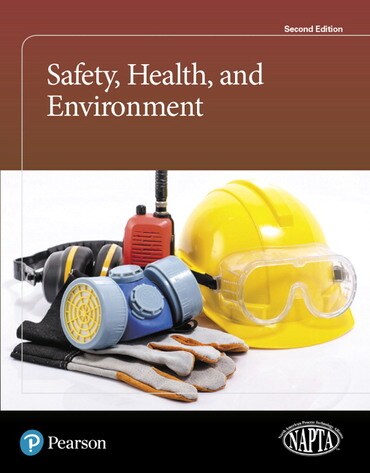
Safety, Health, and Environment, 2nd edition
Looking for the K12?See school programs
Title overview
For safety, health and environment courses within a process technology program.
The national standard for safety, health and environmental issues of process technology
Safety, Health, and Environment is part of the NAPTA Series for Process Technology, which can be used independently and does not require NAPTA participation. Developed with Industry and Education, the series supports a consistent curriculum and exit competencies for Process Technology graduates.
The 2nd Edition provides an up-to-date common national standard for the Safety, Health, and Environment course of a Process Technology degree program. It is fully revised to align with the new NAPTA curriculum.
Hallmark features of this title
- Safety, health and environment issues are broken into sections covering the types of hazards a process technician might encounter (Ch. 2-17) and the controls and equipment used to reduce the risks associated with each of these hazards (Ch. 18-24).
- Activities in each chapter give students or small groups practice applying chapter concepts.
- Appendix A, Government/Regulatory and Industry Resources, provides websites and contact information for agencies and organizations concerned with safety, health and environmental issues of the process industries.
New and updated features of this title
Learning aids reflecting the latest NAPTA curriculum
- NEW: New learning outcomes align with NAPTA core objectives. Students are directed to the precise page of a text where a learning objective is addressed.
- NEW: A new full-color art program includes more than 300 revised artwork and photo images, including new visuals representing safety, health and environmental issues of the process industries.
- UPDATED: Checking Your Knowledge questions have been updated to better complement chapter objectives. Answers are now included.
Practical, on-the-job applications
- EXPANDED: New and more in-depth content expands on government regulations and data, hazardous atmospheres and respiratory protection issues, and safety issues related to equipment.
- EXPANDED: Roles of a process technician are explored, offering context for students considering a career in the process industries. Topics include process safety management, safe practices during an emergency response, and duties of fire watch attendants and confined space attendants.
Table of contents
1. Introduction to Safety, Health, and Environment
2. Types of Hazards and Their Effects
3. Recognizing Chemical Hazards
4. Recognizing Biological Hazards
5. Equipment and Energy Hazards
6. Fire and Explosion Hazards
7. Pressure, Temperature, and Radiation Hazards
8. Hazardous Atmospheres and Respiration Hazards
9. Working Area and Height Hazards
10. Hearing and Noise Hazards
11. Construction, Maintenance, and Tool Hazards
12. Vehicle and Transportation Hazards
13. Natural Disasters and Inclement Weather
14. Physical Security and Cybersecurity
15. Recognizing Ergonomic Hazards
16. Recognizing Environmental Hazards
17. Introduction to Hazard Controls
18. Engineering Controls: Alarms and Indicator Systems
19. Engineering Controls: Process Containment and Process Upset Controls
20. Administrative Controls: Programs and Practices
21. Permitting Systems
22. Personal Protective Equipment and First Aid
23. Monitoring Equipment
24. Fire, Rescue, and Emergency Response Equipment
Appendix: Government/Regulatory and Industry Resources
Author bios
About our author
The North American Process Technology Alliance (NAPTA) is an organization of process technology (PTEC) education providers, industry experts and community stakeholders working cooperatively toward a common goal. The NAPTA is the standard-bearer of the PTEC curriculum. The NAPTA audits PTEC degree programs in North America and endorses those that meet its criteria. Eligible colleges have received the NAPTA endorsement.